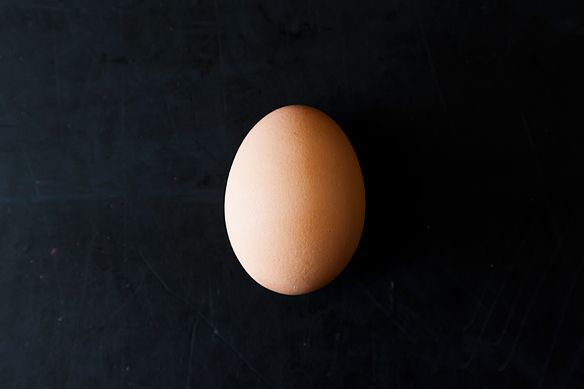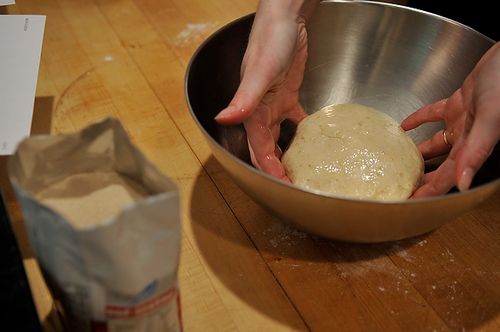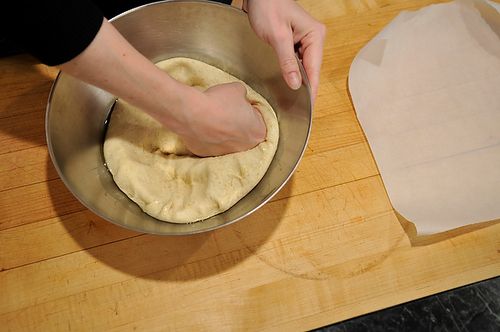We'll be running essays about food memories on Feed52. Want to share your story? View our submission guidelines.
Today, Brette Warshaw writes about remembering how to cook.

I like to cook.
I like to watch a hunk of butter get loose on the stove, and then to pour oil on top of it. I like to toss in a handful of onions and watch them brown. I like to rub carrots and potatoes and parsnips with olive oil and salt and pepper, letting the pieces fall through my fingers and then arranging them into one, neat layer. I like to nestle chickens in with them, and to watch the skin get crackly. I like to hold the yolks of raw eggs in my hands and feel the whites slip through, then to whip them into peaks that hold on their own.
I like to cook. I used to love to cook.
I grew up eye-level to the stove, then a head taller, then two more. I learned my times tables while stirring vats of minestrone, and recited Lincoln and Frost and Shakespeare while dredging chicken breasts in egg, and then breadcrumbs. I sang songs of the fifty states while chiffonading basil, letting the ragged strips of green fluff up in my fingers when I reached the end. And my teacher, my tutor, was my bright-eyed, curly-haired father: correcting my subtraction and my sautéing, picking me up when I couldn’t reach the back burner, helping when my hands weren’t strong enough to knead.
Saturdays were egg days: scrambled eggs one week, over easy the next, then soft-boiled, then fried. I loved the almost-too-brown shallots sticking to the bottom of the pan after an omelet, that streak of runny egg shimmering on the plate, the sticky sliding of the raw whites against my bare fingers as I hunted for the last shard of shell. We ate it all on cream-cheesed toast with orange juice that we made by hand, the four of us – mom, dad, Brette, and brother – sitting at the table, a vase of flowers in the center.
Yes, we were that kind of family.

Sundays were bread days. We’d get up and he’d go down to the dark, damp basement to get that weird-smelling sourdough starter out from the wooden cask, and we’d begin: turning water, flour, and salt into stretchy, shiny, springy dough, sticking our palms into it and thrusting all of our weight on top, kneading and kneading and kneading until it became a smooth, snowy-white sphere. We’d leave it to rest, and I’d check back on it every ten minutes, my eyes wide in awe with how it ballooned so quickly, so suddenly.
There was always wine: lots of it. Wine on the table (a bottle); wine on the counter (a glass). There was always wine and it was usually red, unless he was making fish, and then it was white. Sometimes, I stuck my pinkie in it. I liked it. So did he.
I didn’t notice his progression, but I noticed when it was bad. I noticed when he started lying on the couch before and after dinner. I noticed when he was crabby in the mornings, and I noticed when he woke up late. I noticed when he cut corners: smashing garlic instead of chopping it, buying dough at a pizza parlor, pulling sauces and stocks off the stove too soon.
I noticed when he was gone.
He came back six months later, puffy and yellow, bearing pizza in a box. He asked for forgiveness. We weren’t ready.
I stopped cooking, then. I stopped looking at the stove, the oven, the pots and pans, feeling a lump in my throat as I tiptoed past. I preferred to sit at the kitchen table reading cookbooks, cover to cover, lingering over dainty canapés and towering layer cakes and sushi rolls that I would never make. I read Zagat guides and Michelin guides, Biff Grimes and Frank Bruni and Sam Sifton, deciding which restaurants I would venture to this month, and then the next. I made lists and checked them off and dreamed of twenty-five-course dinners at the fanciest restaurants in New York City. I worked like a dog and saved up all my money, and I spent it all on crudos and porterhouses and perfect chocolate soufflés.
I couldn’t cook. I wouldn’t cook.
And then I started writing. I started writing about food.

I loved writing about food so much that I applied to two prestigious food-writing internships after my sophomore year of college, and I got them. I was ecstatic and – for the first time in my life since I had held that sphere of risen dough in the palm of my hand – unabashedly confident. I was good at something, finally. I could dredge words in flour and egg and stick them in a frying pan, could let them brown and burble and get crunchy and crisp. I could knead words until they got sticky and elastic, then roll them into logs and make deep, cross-wise slashes. I could grind pepper on them until they were speckled with black. I could sprinkle salt all over them and watch them weep.
That summer, when I caught myself telling another intern that “I like to eat; I don’t like to cook,” I realized that something needed to change. I needed to start cooking again.
So I went home, and I pulled my hair back. I washed my hands. I started with those eggs, then cookies, then (layer!) cakes. I felt my left hand sneak around to my back as I battered things to fry – because when cooks fry, they keep one hand clean. I chopped onions, the white, watery flesh giving way to the sharp knife, my wrist moving steadily, the fingers on my left hand curling involuntarily. I knew exactly when to pull my roasted vegetables from the oven, and how much pasta water to add to a sauce. Twirling and spinning around a kitchen felt natural, right. Not easy, but worth it.
And sometimes, I join my dad at his new house, and we cook together. We cook pastas and soups and big hunks of meat, doing a tango in a new kitchen, but a tango that we know well. There is no wine anymore, but there’s a SodaStream on the counter and lots of iced tea.
I forgave, as one would say, but I didn’t forget. And, it turns out, I didn’t – I couldn’t – forget how to cook.




See what other Food52 readers are saying.